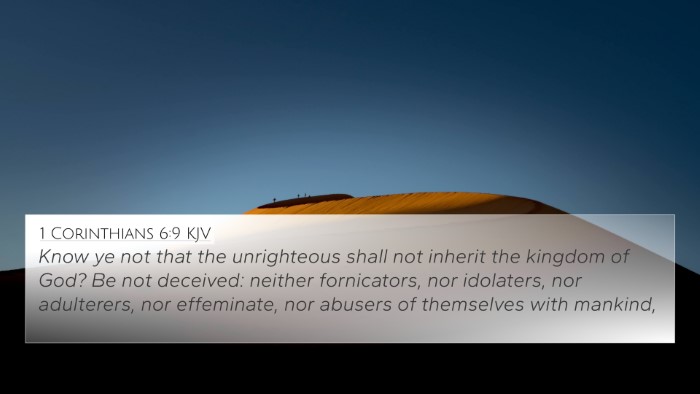Understanding 1 Corinthians 10:8
Bible Verse: 1 Corinthians 10:8 - "Neither let us commit fornication, as some of them committed, and fell in one day three and twenty thousand."
Contextual Overview
The Apostle Paul, in his letter to the Corinthians, addresses issues of idolatry and immorality, drawing on the history of Israel to emphasize the consequences of disobedience. This verse specifically references an incident from the Old Testament where the Israelites angered God through their illicit actions.
Commentary Insights
-
Matthew Henry:
Henry explains that this admonition stems from the historical example of the Israelites in the wilderness. He emphasizes that the fall of twenty-three thousand was a direct result of God's judgment against their sin, highlighting the seriousness of sexual immorality and its repercussions.
-
Albert Barnes:
Barnes elaborates on the fact that the reference to fornication signifies not only physical immorality but also spiritual unfaithfulness. He draws connections to how the Christian community should avoid similar pitfalls by recognizing the stark realities of judgment that befell the Israelites.
-
Adam Clarke:
Clarke provides historical context, noting the incident is a cautionary tale about temptation. He indicates that the punishment serves not only as a reminder of divine justice but also as an encouragement for believers to maintain purity in their conduct.
Key Themes
This verse encapsulates several pivotal themes within Christian doctrine:
- Warning Against Sin: The severe consequence serves as a reminder of the risks involved in yielding to temptation.
- The Importance of Faithfulness: The dual idea of fidelity (both in terms of relationships and faith) enhances the understanding of God's expectations for His people.
- Divine Judgment: Illustrates how God’s justice operates in response to human actions.
Related Bible Cross-References
- Numbers 25:1-9 - The story of the Israelites’ sin at Peor.
- Exodus 32:26-28 - The judgment following the golden calf incident.
- Psalm 106:29-31 - Reflects on Israel's rebellion and its consequences.
- 1 Thessalonians 4:3 - Emphasis on sexual purity within the Christian community.
- Hebrews 3:11 - Warning against unbelief leading to falling short of God's promise.
- 2 Peter 2:4-6 - Discusses judgment upon the unfaithful as a historical precedent.
- Jude 1:7 - Referencing the example of Sodom and Gomorrah for immorality.
Comparative Bible Verse Analysis
Cross-referencing this verse can illuminate broader theological discussions:
- Connections with Old Testament: 1 Corinthians 10:8 can be examined alongside Numbers 25 to comprehend the gravity of communal sin.
- Inter-Biblical Dialogue: The New Testament emphasizes the moral imperatives laid down in the Old Testament (e.g., Romans 15:4).
- Thematic Links: The theme of temptation and its consequences recurs throughout scripture, linking back to passages like James 1:14-15.
Concluding Thoughts
This verse serves as a stern reminder to contemporary believers. Understanding the historical context and theological implications sheds light on its application today. The emphasis on purity and fidelity remains relevant, urging a reflective engagement with both personal conduct and corporate integrity within the Christian faith.







